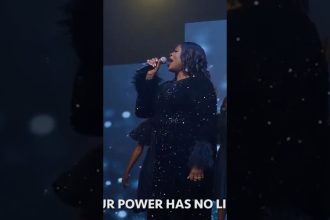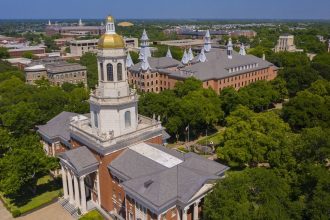Adedotun Olateru-Olagbegi is the founder and CEO of LIGHTSPEED Imaging Limited, a creative technology company which recently unveiled Nigeria’s first immersive water projection mapping experience. He speaks in this interview with Iheanyi Nwachukwu. Excerpts
“These efforts reflect LASWA’s dedication to transforming Lagos’s waterways into vibrant spaces that support both functional transportation and innovative experiences like LIGHTSPEED’s projection mapping.”
As the founder of LIGHTSPEED, kindly tell us about yourself and the company.
My name is Adedotun Olateru-Olagbegi, and I’m the Founder and CEO of LIGHTSPEED Imaging Limited—a creative technology company pioneering immersive storytelling through light, projection, and stagecraft across Africa.
I’m an award-winning lighting designer with over a decade of experience in architectural and entertainment lighting. My journey began in the United Kingdom with Notting Hill Media, but a visit to Las Vegas sparked my passion for architectural lighting. I returned to Nigeria in 2010 to introduce GOBO projection technology—a first in the country—and that innovation evolved into the foundation of LIGHTSPEED.
Today, LIGHTSPEED specialises in immersive water projection mapping, live event design, and technical production. We don’t just design experiences—we also own and operate a full suite of professional lighting and staging equipment, allowing us to execute high-impact productions end-to-end.
We’ve delivered some of the continent’s most iconic visual experiences, including Big Brother Naija, Soundcity MVP Awards, and the X100 Music Festival, fusing African culture with cutting-edge technology.
Our most recent achievement is Nigeria’s first immersive water projection mapping experience, proudly supported by LASWA and LASAA. This innovation doesn’t just push creative boundaries—it also helps Nigeria save valuable foreign exchange by localising advanced tech solutions.
At our core, LIGHTSPEED exists to transform ideas into unforgettable moments—using light, space, and imagination to elevate African storytelling to global standards.
Your company recently unveiled Nigeria’s first immersive water projection mapping experience. What motivated you to do this?
We didn’t just want to entertain—we wanted to spark a shift in what’s possible. Nigeria has always had the talent, the energy, and the culture; what we needed was a platform that matched that brilliance. Water projection mapping is our way of rewriting the rules—merging art, tech, and storytelling to create something truly immersive. It’s a glimpse into the future of African experiences, and we’re proud to be leading that charge from right here at home.
Are there major roles Lagos State Waterways Authority played that enabled LIGHTSPEED to achieve this feat?
Yes, the Lagos State Waterways Authority (LASWA) played a pivotal role in enabling LIGHTSPEED to achieve Nigeria’s first immersive water projection mapping experience. The event was hosted at LASWA’s venue in Falomo, where a 12-metre-high water curtain served as the projection surface for the groundbreaking installation. This collaboration provided the necessary infrastructure and support for LIGHTSPEED’s innovative showcase.
While specific details of LASWA’s involvement in this particular project are not extensively documented, their broader initiatives demonstrate a commitment to enhancing Lagos’s waterways for diverse uses. For instance, LASWA has been actively involved in projects aimed at developing mass public inland waterways transportation, including the procurement of electric-powered vessels to promote sustainable transport solutions.
These efforts reflect LASWA’s dedication to transforming Lagos’s waterways into vibrant spaces that support both functional transportation and innovative experiences like LIGHTSPEED’s projection mapping.
How will this newest feat revolutionise visual entertainment across West Africa?
This isn’t just a milestone for us—it’s a spark for a new era of storytelling in West Africa. With immersive water projection mapping, we’re redefining what visual entertainment can look like across the continent. It opens up a whole new canvas—one where culture, tech, and environment collide to create experiences that are larger than life. We believe it will inspire a wave of innovation, push creative boundaries, and prove that Africa can lead in experiential entertainment—not follow. This is just the beginning.
Lagos is just one out of 36 states and the FCT. What plans do you have to ensure other states have a feel of this imaginative storytelling on their water surfaces?
Lagos was the beginning, not the limit. We’re actively exploring partnerships with state governments, tourism boards, and cultural institutions to bring this experience to rivers, lakes, and waterfronts across Nigeria. Imagine immersive storytelling on the Niger River during the Argungu Festival or on the Calabar River as part of Carnival Calabar. Our technology is mobile and adaptable, designed to travel and integrate with local narratives. This is about celebrating Nigeria’s diversity—state by state—through innovation, art, and unforgettable visual experiences.
Can you speak to the financing of such cutting-edge tech projects… possibly challenges in sourcing funds?
Financing a project of this scale—at the intersection of art, technology, and infrastructure—comes with its fair share of challenges. Immersive water projection mapping doesn’t always align with conventional funding structures, especially in a market where experiential innovation is still emerging. That said, we’ve been fortunate to work with visionary partners. Support from agencies like LASWA and LASAA has been instrumental—not just in terms of access and logistics, but in believing in the power of storytelling to transform public spaces.
We’ve also leaned into strategic private investments and brand collaborations. Moving forward, scaling this across Nigeria will require deeper public-private partnerships (PPP), cultural grants, and innovation-focused funding. Because this isn’t just entertainment—it’s nation branding, tourism, and the creative economy all in one.
No doubt you have saved Nigeria from spending limited FX to engage foreign companies for this, so in dollar terms, what has this technology saved the country?
By developing Nigeria’s first immersive water projection mapping experience locally, LIGHTSPEED helped save the country an estimated $160,000 to $340,000—the typical cost of hiring foreign firms for a similar show. Beyond the FX savings, it also created local jobs, boosted tech capacity, and positioned Nigeria as a leader in experiential storytelling across Africa.
Kindly speak on the durability of this project and the role of insurance companies.
Durability was engineered into every layer of this project. The water projection system uses marine-grade stainless steel, industrial-grade pumps, and UV-protected nozzles—built to endure prolonged exposure to humidity, salinity, and Lagos’s variable weather. The water curtain itself is self-draining with automated pressure calibration, reducing wear and tear.
On the insurance front, we’ve collaborated with providers to cover high-risk elements—ranging from electrical faults to equipment theft and third-party liability. This not only protects our assets but also reassures venue partners, state agencies, and potential clients. As we scale, we’ll be working with insurers to develop more tailored policies for large-scale outdoor tech installations in emerging markets like ours.







